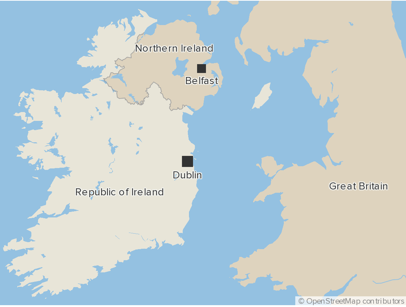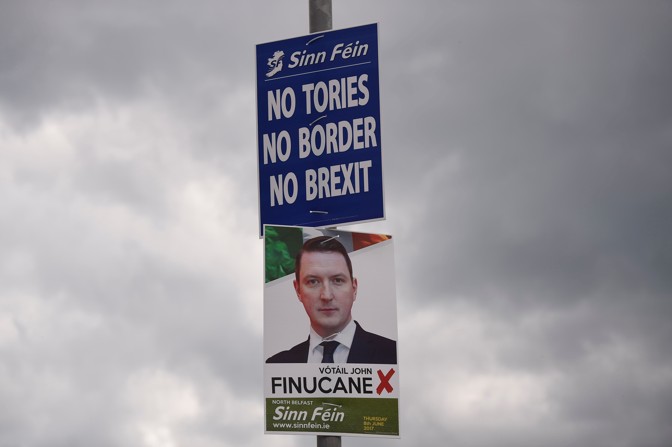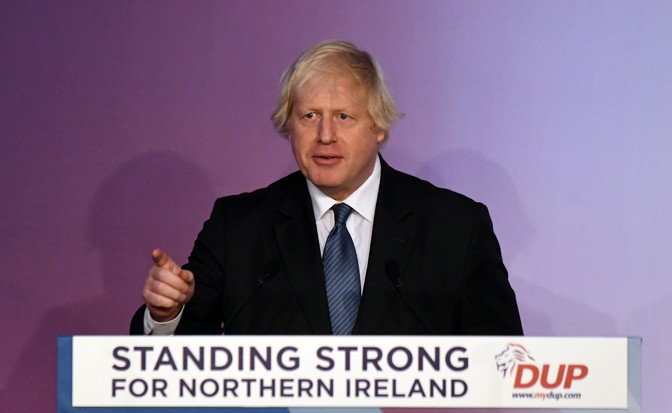BELFAST—I’m driving across Europe’s most divided city, where politics is existential and fear often only a few streets away.
We’re heading west toward the River Lagan from the largely Protestant east, the flags of illegal paramilitary groups hanging limply from lampposts. Sitting beside me in the car is someone who describes himself as “an active loyalist”—loyal to the British Crown and state and opposed to a united Ireland—but, like other unionists I spoke with, asked not to be identified for fear of retribution. He is a member of the city’s Protestant working class, which has united in anger at Prime Minister Boris Johnson’s prospective Brexit deal with the European Union, principally because of the de facto customs border that it proposes between Northern Ireland and the rest of the United Kingdom, in order to avoid one with the Republic of Ireland.
Johnson called a general election seeking a mandate to deliver his deal. In loyalist parts of Belfast, they are determined to show he has no mandate from them.
To my passenger and every other Protestant unionist I met, in Belfast first and then in rural Fermanagh, near the Irish border, Johnson’s plan was a betrayal. Not just any betrayal, in fact, but a betrayal of the very issue most fundamental to them: the union between Northern Ireland and Great Britain, whose preservation had been the source of a decades-long civil war before the 1998 Good Friday peace agreement brought it to a close with an explicit recognition from all sides that Northern Ireland would stay in the United Kingdom as long as a majority of its people wanted it to. Again and again in my conversations here, I was told that Johnson’s Brexit deal amounted to a betrayal of this peace settlement—an “appeasement” of Irish Republicanism and its implicit threat of violence should any land-border controls be erected with the Republic of Ireland.

This perceived betrayal goes to the heart of the sectarian fissure that continues to dominate Northern Ireland: between the mostly Protestant unionists, who largely identify as British, not Irish, and the largely Catholic nationalists, whose identity runs the other way and who would like to see Northern Ireland united with the Republic of Ireland. They are two communities in a zero-sum contest over which country to belong to. From the late ’60s to the mid-’90s, they were at war—the Irish Republican Army attempting to shoot and bomb their way to Irish unity; loyalist paramilitaries, fearful of British weakness (but whose leaders are now known to have colluded with British forces), responding with their own violence to stop such an outcome. While the IRA killed far more than any other group throughout the conflict, by the early ’90s, loyalist paramilitary organizations were carrying out more murders than they had in the past in an effort to terrorize the Republican community to end their campaign.
While British policy ever since the Good Friday Agreement has been to support whichever outcome the majority of Northern Ireland’s population chooses, the Conservative Party—officially the Conservative and Unionist Party—has remained explicitly in favor of the union. And in Johnson, Northern Ireland’s unionists felt they had an ally, a man who became prime minister on a promise to protect the union, staking his political capital on being able to enact Brexit without internal economic barriers.
Yet in creating separate customs and regulatory rules for Northern Ireland compared with the rest of the U.K., necessary to ensure there are no controls on the border with the Republic of Ireland, the Johnson deal has reawakened Protestants’ primeval fears of betrayal and loss; that the union—and with it, their country—is being taken from them through a combination of British weakness and Republican menace. To the angry Protestant unionists I met, the law of the big stick is triumphing again: He who holds it, wins.
Like the Ulster mist, this existential fear is often imperceptible, but drenches everything. Nothing in Northern Ireland is understandable without first understanding this.
I had traveled to Northern Ireland to see what a Johnson victory—or defeat—in Britain’s general election on December 12 would mean for this part of the United Kingdom. What will emerge here, from the toxic combination of perceived betrayal and fear that has taken root in the unionist community? Most fundamentally of all, will a Conservative victory, and the subsequent imposition of Johnson’s deal, lead only to unionist disillusionment, or something more sinister?
[Read: How Brexit threatens peace in Northern Ireland]
The question has been given little serious scrutiny in London or internationally, but is focusing minds in Belfast and Dublin. Northern Ireland is once again playing almost no role in the U.K.’s national-election debate, despite being the central issue in the Brexit negotiations and almost derailing the country’s exit altogether. In England, the largest of the U.K.’s constituent nations, the politics of Brexit is a major issue in the polls, but sits alongside other questions—of health-care funding and police numbers, crime and immigration. Here in Northern Ireland, Brexit is the issue, feeding and amplifying the underlying source of tension that dominates all else: the constitutional question of sovereignty. Should Northern Ireland be British, Irish, or something in between?
East of the Lagan are Belfast’s more prosperous, and mostly Protestant, neighborhoods. On the other side of the river, loyalist and nationalist housing developments more obviously jut up against each other, kept apart by “peace walls.” Here lies the lower Shankill area, a loyalist stronghold in the constituency of North Belfast, which has become a lightning rod in the upcoming election.
Nigel Dodds, the leader in Westminster of the Democratic Unionist Party—the main unionist party in Northern Ireland, which has helped prop up the Conservative government since 2017—is facing a showdown against Sinn Fein, the main Irish Republican party. Sinn Fein’s candidate, John Finucane, is the son of Pat Finucane, a lawyer who defended members of the IRA and whose murder by loyalist paramilitaries at the height of the Troubles remains controversial, amid ongoing allegations of British state involvement.

Loyalists have erected posters listing the Finucane family’s links to armed Republicanism. The posters accuse the family of being “steeped in the blood of our innocents.” Sinn Fein, meanwhile, has allowed the convicted IRA terrorist Sean Kelly to campaign for Finucane in the constituency, even though it borders the area where Kelly killed nine people in a bombing in 1993. Like nowhere else in the United Kingdom, the past is alive in Northern Ireland.
At the Lower Shankill Community Association center, where I’m meeting leading loyalist figures from the area, I’m offered tea and a chat with three men who ask to remain anonymous. Their universal response was one of rage and a fierce loathing for turncoat Tories who had vowed to stick by the unionists, only to abandon them to secure a Brexit deal more favorable to euroskeptic England. Particular hatred was reserved for the hard-line Brexiteer caucus within the Conservative Party, which had formed a tight alliance with the DUP against Theresa May’s earlier Brexit deal, which also treated Northern Ireland differently from the rest of the country. At the last minute, however, these Tory hard-liners broke off their alliance with the DUP to back Johnson’s deal. The sense of betrayal was felt acutely by all those I spoke with in Belfast and Fermanagh. Yet there was something else, something more subtle—something close to hurt at what had happened and a fear of what it will mean for them in the future.
Many of the unionists I spoke with—all but one in fact—had supported Brexit, some in the hope that it would clarify Northern Ireland’s distinctness from the Republic of Ireland, but had watched in horror as the government in London, faced with a choice of a no-deal exit from the EU or distinct arrangements for Northern Ireland, chose the latter instead. The effect, unionists believe, has been to make Northern Ireland more distinct from Britain—the exact opposite of what they had hoped.
To many unionists, this is what hurts the most: the public rejection from those to whom you pledged your allegiance. As a result, unionist politicians in Northern Ireland are now asking their supporters to unite and rally to the age-old cause, the union, just when the government, its government, is perceived to have abandoned it.
As we drove to the community center, the loyalist passenger sitting next to me admitted he was wrestling with this uncomfortable irony. “It’s like the mother who hammers her kids all the time,” he said. “She beats them, all that, but at the end of the day, the kids still love her.” I’ve heard variations of this metaphor on previous trips here, all seeking to encapsulate the conflicted nature of the relationship between Northern Ireland’s unionists and their apparently disloyal countrymen across the water. If your partner is forever unfaithful, the argument goes, why stick around?
[Read: Brexit and Britain’s Northern Ireland déjà vu]
The answer is complicated. At its heart, the unionist cause is not about customs-clearance forms or economic divergence as laid out in Johnson’s deal, but in the harder-to-define concepts of identity and belonging. It is tied up in history and inheritance, identity and nation, great-grandfathers killed for king and country at the Somme and fathers killed by the IRA half a century later; in the sense that what is being threatened is about more than which flag flies over Belfast City Hall, but a way of life, a culture and country that someone wants to take from you without your permission.
In North Belfast, the DUP is about to discover whether its working-class base will rally to the party because of the perceived threat to the union and all that it represents—or whether they will punish the party for failing to protect it in the first place. The party, after all, in its governing arrangement with the Conservatives, has held almost unprecedented influence in London. The charge the DUP faces is straightforward: If it could not defend the union, then what good is it?

There’s also a more fundamental question: If the reality of Brexit (as opposed to its promise) threatens the union in the way the DUP says it does, why not drop its support for it? Here, the DUP finds itself in a worst-of-all-worlds dilemma. To do so would effectively mean supporting the main British party opposing Johnson’s deal, Labour, and even more problematically, its leader, Jeremy Corbyn—one of the most high-profile British supporters of Sinn Fein, the political wing of the IRA throughout the Troubles.
The DUP says that it needs as many seats as possible to go back to London to continue the fight, and that Johnson might yet need the party’s support should he fail to win a majority, like May before him. According to those in the DUP who spoke with me, the party’s working-class base is up for the fight. It’s the middle-class Protestants they are worried about; those who voted, like Northern Ireland as a whole, to remain in the EU and who would just like the whole thing to go away. In the battle ahead, the question is which political drive will prove stronger: opposition to Brexit or tribal loyalty?
Northern Ireland is a place not so much trapped by its history, but one that is living it every day. Here the question of which state it should belong to remains contested, its people divided on the very basics of the symbols and structures of most ordinary societies.
Through luck and circumstance, its principal unionist party has for two years held the balance of power in London. Yet, should it not after December 12—should Johnson, instead, emerge with a Conservative majority to impose his deal on Northern Ireland—unionism will be politically powerless.
What will unionists do then? The message from some in Belfast and Fermanagh, true or otherwise, was that political defeat in London would not be the end of the story, that protesters would take to the streets, that the Good Friday Agreement would be dead. Some older heads disagreed, arguing that unionism will eventually have to learn to live with the Johnson deal. Eventually, they would have little choice but to get on with their lives, betrayed or otherwise. The alternative would be to risk making the nationalist case for them: that Northern Ireland doesn’t work and would be better in a union with Ireland, not Britain. “We’re fucked,” as one of the older Shankill loyalists told me.
[Read: Belfast shows the price of Brexit]
The more toxic concern, though, is the emerging sense of powerlessness coupled with age-old existential fear and the belief that what is happening is unjust. Irish Republican warnings that any new land-border checks would be targeted were held up in Dublin and London as reasons to avoid such infrastructure. What of unionist concerns? “If you’re sending a signal that the threat of violence gets you somewhere, that’s a really bad signal,” one of the loyalists at the Shankill center said. What lessons should loyalists take from this? another asked.
There is already talk, repeated back to me in Belfast and rural Fermanagh, of blockading the ports into Northern Ireland to make the new economic border checks unworkable. Other scenarios set out included disrupting trade with the Republic of Ireland. The threats, according to two senior political operatives in Northern Ireland, one DUP and one unaligned, are not as hollow as they might seem. Both pointed to a part of the Brexit deal that states, “If the application of this Protocol leads to serious economic, societal or environmental difficulties that are liable to persist … the United Kingdom may unilaterally take appropriate safeguard measures.” In effect, if there is sufficient turbulence, unionists could force London’s hand.
To the DUP’s Protestant critics, the very fact that suggestions of rioting and unrest are now so prevalent is a testament to unionism’s collective political failure. Such talk, they say, will prove hot air that should not be taken too seriously. Either way, in Northern Ireland, like the Belfast rain, feelings of betrayal, anger, and fear come and go, but never quite leave entirely. There’s a growing sense another downpour is coming.

No comments:
Post a Comment